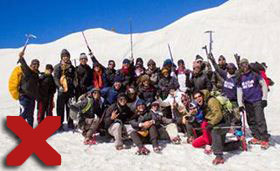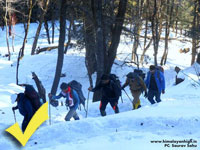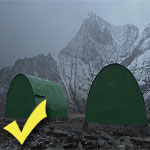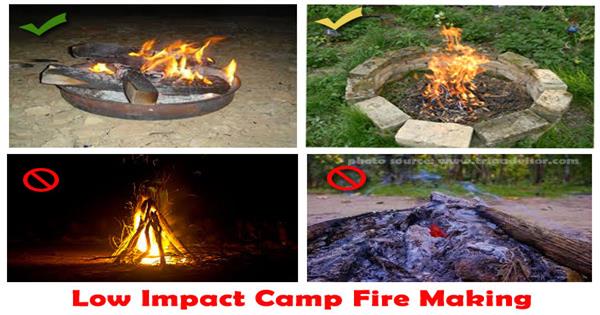With increasing in various activities in the wild, its also causing a negative impact on the ecology of the area. The wild animals who are not used to humans are encountering them. The silent valleys are no more silent. Preserving the fast deteriorating nature for our future generation has become a big task now. Below, we have listed camping etiquette which are eco-friendly and has a low impact on the nature.
Any principle or a good cause is difficult to follow but it takes a good heart and strong intentions to follow that. We just cannot keep taking from nature, keep destroying it and give it nothing in return. We cannot leave things thinking that OTHERS are there to take care of !!
Here it goes..
As for any outdoor activity, planning is very important and every great adventure starts with proper planning. While planning, give emphasis on the Leave Not Trace principles.
Planning Your Trip:
Smaller Groups Is The Most Important Factor: Go in small groups. Your ideal group size should be 10 or it can go as high as 16 but should not go beyond it. If reducing the group size is not possible, better decide to split your groups and keep space in between them.
Pack Right: Plan your packing well. Do not bring tins, cans, extra plastic bottles, glasses etc to the mountains. Use reusable ziploc pouches, even for candies if you cannot do without them.
Carry Extra Bags For Waste: Bring extra bags to bring down you waste from the mountains. If possible, show generosity in cleaning other's waste as well. This creates a Negative Trace
Stay Away From Areas Which See Huge Rush: You should stay away from crowded areas and give them a breather as they are already facing the overload. For example, in Indian Himalayas, Roopkund trek is heavily overloaded during May June and September. So, its better you choose another destination equally beautiful to contribute little from your side to save that biosphere.
Color Of Your Clothes: Do Not wear fluorescent colored clothes as it scares away the birds and wild animals. Choose colors that are light and goes with natural colors of region.
Camp only on designated campsites where available. Usually, the forest department or administrators will mark and designate a campsite. Those areas are well researched by the administration on the impacting factors and are then designated to be used as camping area.
If there is a trekkers hut built, do plan use it. The purpose of building the trekkers hut is not just earning revenue, but it also aids low impact camping principles









Camping Etiquette
Never camp close to the water source and do not use the water source directly for washing dishes, cleaning vegetables, washing your face, brushing or other actions which introduces artificial chemicals like soap, detergent etc into the water. Water bodies are frequented by animals. Its important to keep a distance.
Being Loud is absolutely a bad practice in the wild. It disturbs the wild animals. Sometimes, being too loud can trigger avalanche as well in avalanche prone areas. Remember, Loud for human beings is actually too too much loud for the animal ear drums. Being loud might also be not liked by other members in the group or other groups.
Always use a Cat-Style Dry toilets. Remember to use mud to cover your dump before you leave the place. Never use area close to water source as your dumping area. Remember that the water is used by people in the lower regions and other camping groups as drinking water including yourself.
Do not burn plastic waste. Bring them down and discard them in a proper way. You may use the nearest village's waste discarding methods if available. If not, bring them further down to the nearest city or town where it is available. Remember, your waste, your responsibility
Do not bury your waste as it can be easily dug by wild animals and scattered out.
Keep things Intact, Do not bring them home: Its very important that you leave the things found in the nature like dead bone fragments for example. Do not bring the home as a memory. Use your camera to click pictures and mind to store the memory instead. Its important, as it not only allows others to enjoy similar views but the dead things have a very important role to play in the nature. It still has to give something back to the nature. So its dead, but not finished !! Respect that.
You may take Roopkund trek as an example. The scattered bones which our seniors saw, are we seeing it ?? and Will our future generations see it ??
Making Fire:
FIRE IS NOT FOR FUN, BUT ONLY FOR SURVIVAL. Not only the smoke that comes out of the fire is harmful for the nature, but also the leftovers. Apart from destroying the natural wood, it also destroys the natural sight of that place. Use your cooking gears to warm yourself rather than making a fire.
Use body warmers which are available these days. Be sure to dispose them properly.
Use a fire container. If making fire is a must, use a fire container or fire ring.
Read more on this link on /making-a-low-impact-camp-fire-in-your-himalayan-treks

People Manners
Mountains are sensitive and Local People are a part of the ecology . Respect It. The locals include the village people on the way or the local staffs used on the activity. Talk to every one with respect unless you get too friendly. In hindi, use 'AAP' to acknowledge.
Ask for permissions: If you are photographing locals, ask for their permission before clicking their photos. If you want to enter the Kitchen tent, ask the cook. If you want to tip the staffs, ask before you give them money.
Wear Proper Clothes: Usually in Indian Himalayas, if you are camping near a village, Do Not wear shorts, even if you are a man as the local women are shy of it and do not like it. The same applies to women as well, probably at a little higher degree.
Educate and Raise Awareness: It a great opportunity to be able to talk to the locals. Do use the time to increase their awareness and educate them on the ecology, present conditions and ways to make it better. Its a process.
Wild Animals:
Most important thing is to be aware of the simple basic fact that Its you who are in their habitat and not the opposite.
Keep safe and proper distance from wild animals. Do not disturb their privacy.
Do not feed them. Firstly, they are not habituated and might develop a taste for human food which can cascade the problems. It might cause imbalance in their hormones, might change their behavior, and cause other unknown problems.
Camp away from water source as these places are frequented by wild animals, Ibex dominantly found on Himalayan treks are attracted to salt. So store salt properly. Similar case with Bear and other animals who are attracted by the smell of the food and food products.
Lastly, repeating what already spoken about -
Any principle or a good cause is difficult to follow but it takes a good heart and strong intentions to follow that. We just cannot keep taking from nature, keep destroying it and give it nothing in return. We cannot leave things thinking that OTHERS are there to take care of !!